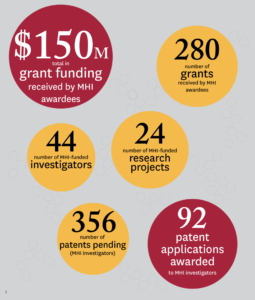A Catalyst for Revolutionizing Health
The Ming Hsieh Institute for Research on Engineering-Medicine for Cancer was established in 2010 upon the endowment gift of $50 million from Cogent founder, USC alum and USC Trustee Ming Hsieh. Ming Hsieh continues to serve on the institute’s board of directors, which is chaired by the USC President.
 The centerpiece of the Ming Hsieh Institute at USC is the integration of engineering, scientific and medical research that together generates novel thinking, speeds discovery and creates new pathways by which research can be translated into real improvements in human health. While the institute’s initial emphasis is on developing new treatments and cures for cancer, it ultimately seeks to fuel new approaches to any human health challenge.
The centerpiece of the Ming Hsieh Institute at USC is the integration of engineering, scientific and medical research that together generates novel thinking, speeds discovery and creates new pathways by which research can be translated into real improvements in human health. While the institute’s initial emphasis is on developing new treatments and cures for cancer, it ultimately seeks to fuel new approaches to any human health challenge.
The university’s interdisciplinary and entrepreneurial focus, commitment to creating new knowledge to improve our world, and forward-looking approach make it the ideal home for the Ming Hsieh Institute. USC is a global leader in engineering and the biosciences, and is among the world’s foremost cancer treatment and research institutes, home to the USC Norris Comprehensive Cancer Center — one of the eight original comprehensive cancer centers funded by the National Cancer Act of 1971.
By bringing together faculty from USC’s renowned programs in engineering, medicine, the sciences and pharmacy, the Ming Hsieh Institute cultivates an environment of creativity and collaboration. The breakthroughs developed by the institute’s interdisciplinary teams are designed to be translated directly into advances in patient care and catalyzed into inventions that can be licensed and commercialized — with the resulting revenue bolstering further research at the institute.
The Ming Hsieh Institute’s pilot grant program plays a unique role in funding early-stage research that has great promise yet limited opportunity to compete for federal funding — which typically only supports longstanding work with proven data. Fostering such high-risk, high-reward research is essential to achieving meaningful advances in improving human health.
Find out more in our Strategic Plan.
MHI Focus Areas
Nanomedicine is the application of nanoscale science and engineering approaches for the improvement of medical care. Nanomedicine is the focus of the Hsieh Institute because it offers the potential to manipulate materials and therapeutic agents at the scale of molecules, so that medications and diagnostics can be precisely delivered for the most challenging diseases, and personalized to the individual. The Institute intends to unlock the potential of nanoscale science and engineering within integrated programs of research, and to focus on cancer, because it today kills more Americans than any other disease.
For more information visit NCI Alliance for Nanotechnology in Cancer.


